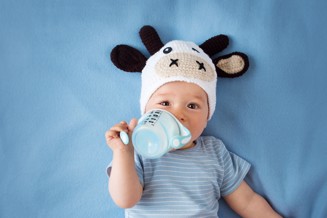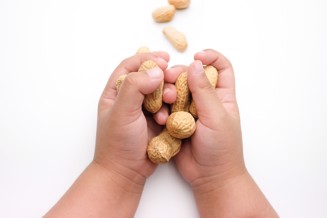
Sometimes it can be hard to know what’s bothering your baby because the only way they can communicate with you is by crying. If your baby has an allergy, try not to worry. They’re really common and according to research, your baby will usually grow out of most allergies after a few years.
Keep your eyes peeled for signs of an allergic reaction by looking for symptoms such as:
- Sneezing
- A runny or blocked nose
- Itchy throat and tongue
- Swollen lips and throat
- A red itchy rash
- Red, itchy, watery eyes
- Wheezing
- Coughing
- Sickness or diarrhoea
However, some babies can suffer of anaphylaxis which is a severe allergic reaction that constricts the airways and makes it difficult to breathe. Call for immediate medical help if your baby is struggling to breathe, seems dizzy or their skin is swollen and itchy. Symptoms often appear immediately or within an hour of eating or drinking.
Food and drink allergies
Cows’ milk protein
According to health authorities in US, an allergy to cows’ milk protein is one of the most common childhood food allergies, affecting between 2% and 7.5% of babies under the ages of one. This is because their immune system is not yet fully developed and they find it difficult to process this milk protein. Keep a look out for:
- A skin reaction – red, itchy rash or swelling around the lips and face
- Digestive discomfort – stomach cramps, colic, vomiting, diarrhoea
- A runny or blocked nose
If you think your baby could have a cows’ milk allergy contact your GP who will be able to diagnose and advise you on how to manage your baby’s allergy.
Lactose intolerance
Having a lactose intolerance means that the body is unable to digest the natural sugar found in milk (lactose). Look out for symptoms such as:
- Trapped wind
- Diarrhoea
- Vomiting
- Frequent wind
- Loud tummy sounds
- Frequent crying after feeds
If you think your baby might be lactose intolerant go and see your GP for a diagnosis.

Nuts
Your baby may be at risk of having an allergy to nuts if there’s a history of allergies in the fami-ly, or they already are diagnosed with other allergies such as eczema, wheat or milk. If this is the case, seek advice from your healthcare provider about how to introduce nuts into your baby’s diet safely.

Wheat and yeast
Babies with a wheat allergy usually grow out of it after a few years. An allergy to wheat shouldn’t be confused with Coeliac disease, although a gluten-free diet could help. Yeast is found in bread and fruit. If your baby is allergic to yeast, too much of these foods could trigger a reaction.
If your baby is allergic to wheat or yeast they may have skin irritations, stomach cramps, sick-ness and wheezing suddenly, within minutes of eating or even after a few hours later so keep your eyes peeled. A good way to keep tabs on trigger foods is to keep a food diary; this will help to identify any problem foods. Take this with you to your GP to help get a diagnosis of their allergies.
Other allergies
Eczema
Eczema causes patches of dry, red and itchy skin on the face and body. Usually around the neck, elbows and knees. Eczema can be very uncomfortable for your baby, but you can help soothe the itching by:
- Applying an unperfumed moisturiser several times a day
- Avoiding soap and bubble baths
- Keeping their bedroom cool
- Washing their favourite toys and bed linen every week at 60°C
- Avoiding irritating fabrics that seem to make their rash worse
Symptoms can occur from as young as 2 months old, but the good news is that most babies grow out of eczema.
Hay fever
Hay fever is an allergy to pollen from trees, grasses and flowers and is usually worse between March and September when the pollen count is high. Common symptoms include sneezing, a runny or blocked nose, itchy eyes and throat.
It’s relatively easy to manage hay fever, you can avoid trips to the park when the pollen count is high, soothe your baby’s face with a cool damp cloth if they’re suffering and avoid drying their clothes on the outside washing line. Speak to your GP for further advice if your baby’s symptoms are more severe.
Coeliac disease
Coeliac is an autoimmune disease that can affect the absorption of food nutrients that can lead to nutritional deficiencies such as anaemia. Although coeliac disease isn’t an allergy, it can display symptoms that might cause you to think your baby is intolerant to certain foods.
If your baby often has frequent diarrhoea and bloating see your GP for a diagnosis. A gluten-free diet will reduce these symptoms and will help your baby feel more like themselves. Talk to your doctor for advice for ideas on what to include in a gluten-free diet.
What next?
The information above only provides a guideline of what to expect from baby allergies, it’s not professional medical advice. If you have any questions or require medical advice you should contact your GP.


